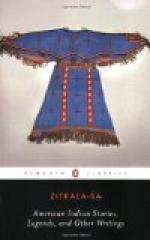IV.
Retrospection.
Leaving my mother, I returned to the school in the East. As months passed over me, I slowly comprehended that the large army of white teachers in Indian schools had a larger missionary creed than I had suspected.
It was one which included self-preservation quite as much as Indian education. When I saw an opium-eater holding a position as teacher of Indians, I did not understand what good was expected, until a Christian in power replied that this pumpkin-colored creature had a feeble mother to support. An inebriate paleface sat stupid in a doctor’s chair, while Indian patients carried their ailments to untimely graves, because his fair wife was dependent upon him for her daily food.
I find it hard to count that white man a teacher who tortured an ambitious Indian youth by frequently reminding the brave changeling that he was nothing but a “government pauper.”
Though I burned with indignation upon discovering on every side instances no less shameful than those I have mentioned, there was no present help. Even the few rare ones who have worked nobly for my race were powerless to choose workmen like themselves. To be sure, a man was sent from the Great Father to inspect Indian schools, but what he saw was usually the students’ sample work made for exhibition. I was nettled by this sly cunning of the workmen who hookwinked the Indian’s pale Father at Washington.
My illness, which prevented the conclusion of my college course, together with my mother’s stories of the encroaching frontier settlers, left me in no mood to strain my eyes in searching for latent good in my white co-workers.
At this stage of my own evolution, I was ready to curse men of small capacity for being the dwarfs their God had made them. In the process of my education I had lost all consciousness of the nature world about me. Thus, when a hidden rage took me to the small white-walled prison which I then called my room, I unknowingly turned away from my one salvation.
Alone in my room, I sat like the petrified Indian woman of whom my mother used to tell me. I wished my heart’s burdens would turn me to unfeeling stone. But alive, in my tomb, I was destitute!
For the white man’s papers I had given up my faith in the Great Spirit. For these same papers I had forgotten the healing in trees and brooks. On account of my mother’s simple view of life, and my lack of any, I gave her up, also. I made no friends among the race of people I loathed. Like a slender tree, I had been uprooted from my mother, nature, and God. I was shorn of my branches, which had waved in sympathy and love for home and friends. The natural coat of bark which had protected my oversensitive nature was scraped off to the very quick.
Now a cold bare pole I seemed to be, planted in a strange earth. Still, I seemed to hope a day would come when my mute aching head, reared upward to the sky, would flash a zigzag lightning across the heavens. With this dream of vent for a long-pent consciousness, I walked again amid the crowds.




